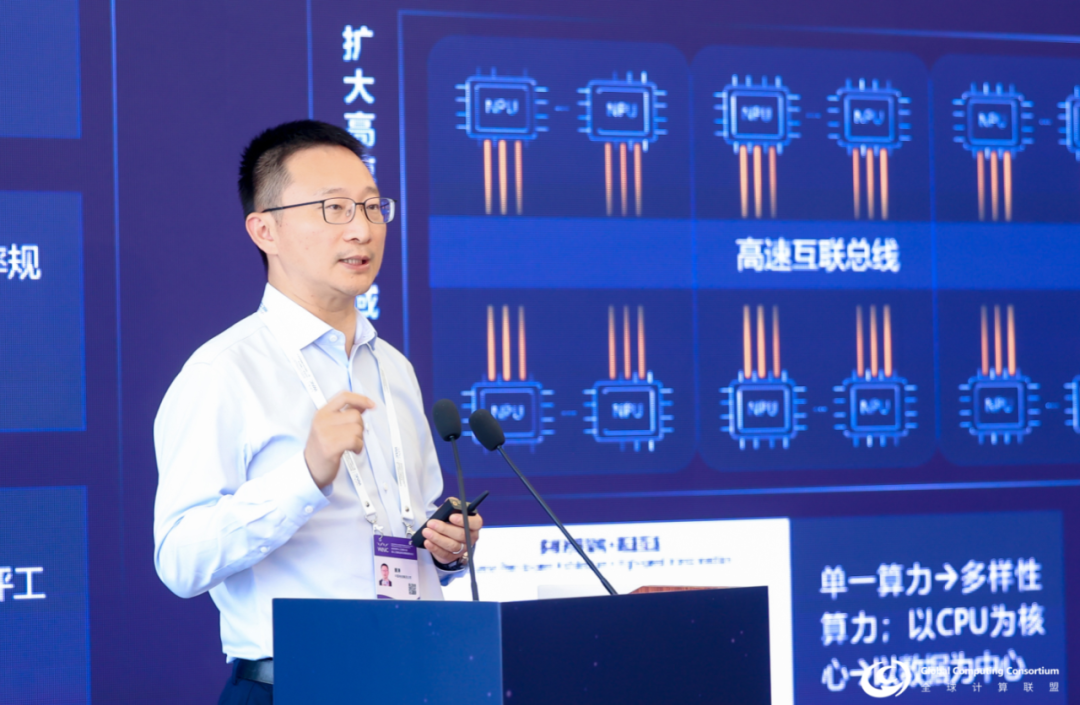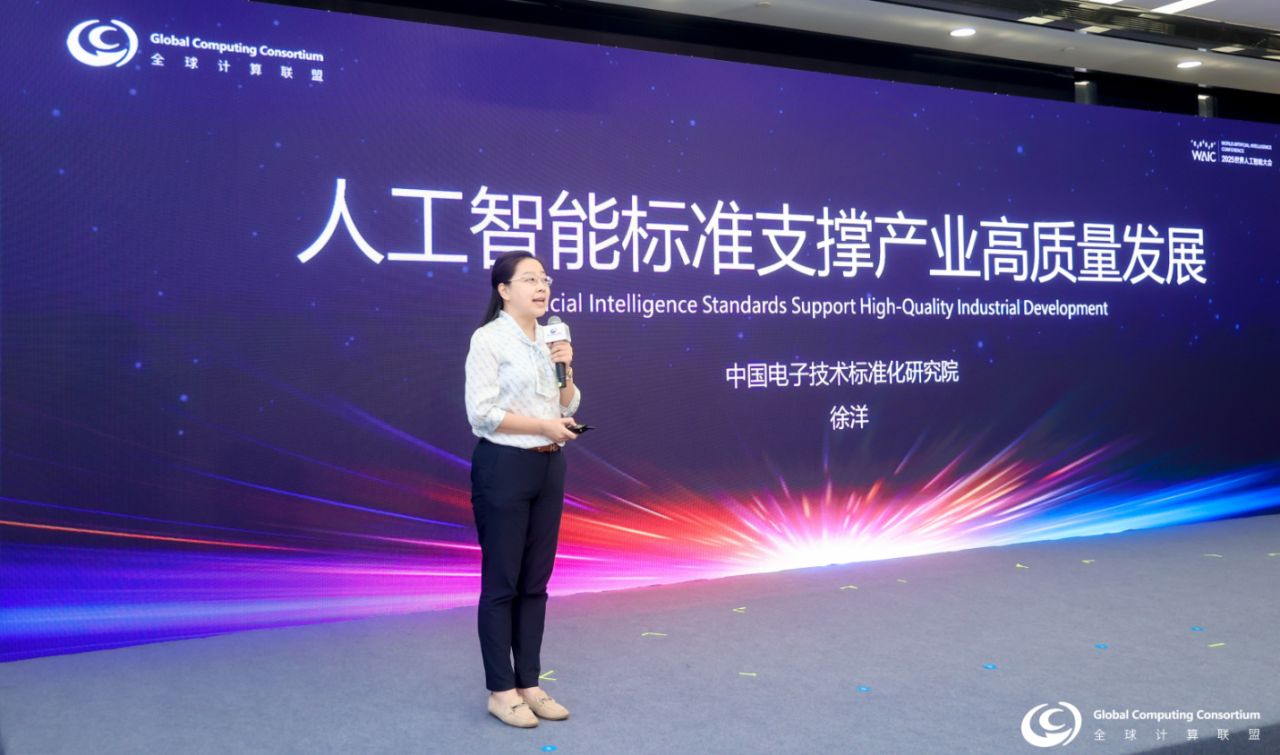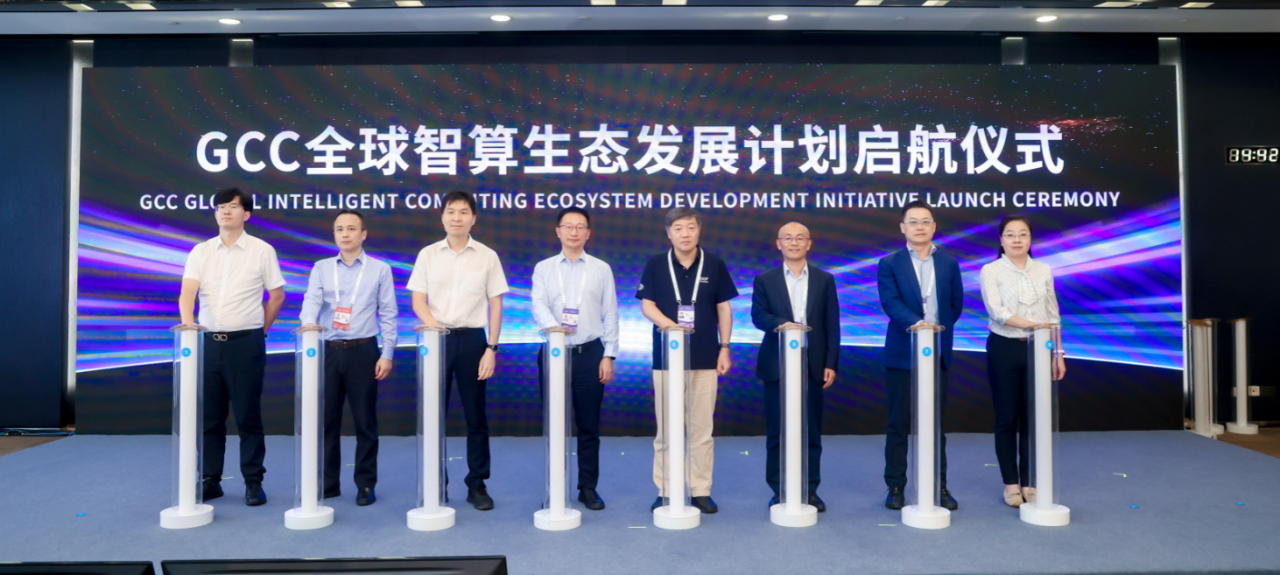

News
author:GCC
Keynote Speech: Charting the Blueprint for Intelligent Computing Development and Promoting Global Ecological Collaboration
The chairperson of this forum, the chairman of the GCC Strategic Advisory Committee, and the director of the Shenzhen National Laboratory for Information Technology, Mr. Gao Wen, pointed out that currently, artificial intelligence is reshaping the global computing industry along the paths of "generalization, integration, and inclusiveness", and intelligent computing has become the core engine driving the digital economy. From three dimensions of strengthening the technical foundation,open the transformation link, and building a collaborative ecosystem, he expounded on the development direction of the intelligent computing industry.
Subsequently, Mr. Jin Hai, the chairman of the GCC and a professor and doctoral supervisor at Huazhong University of Science and Technology, delivered a speech. He reviewed the achievements of the Global Computing Alliance over the past year, including the establishment of a complete management system, the release of multiple industry standards and research results, and the absorption of 242 member units. Mr. Jin Hai emphasized that intelligent computing, as the core engine of the new type of productive forces, is currently facing systematic challenges such as technological innovation, ecological collaboration, and value transformation. This forum is an important platform for consolidating global consensus and discussing collaborative paths. We look forward to jointly exploring the underlying logic for the sustainable development of intelligent computing with all parties.
Mr. Dong Tao, the Director of GCC Intelligent Computing Industry Development Committee and the General Manager of the Cloud Network Development Department (International Department) of China Telecom Group Co., Ltd., starting from the analysis of the trends, technical challenges and industrial challenges of the intelligent computing industry, shared the goals, vision of the GCC Intelligent Computing Industry Development Committee, as well as the exploration and practice of five major industrial specializations: High-speed Interconnection Specialization: Promoting consensus on the peer-to-peer computing architecture industry, incubating standards and evaluations, and creating an industrial ecosystem data format Specialization: Studying the low-bit data format HiF8 standard and ecosystem, launching joint innovation with key partners around value scenarios such as text-to-video generation and large language models, Industry Model Specialization: Collaborating with the Magic Community, promoting the improvement of the industry's large model ecosystem, and accelerating the implementation of industry practice. Open Liquid Cooling Specialization: Jointly building an open liquid cooling standard system in the L0/L1/L2 dimensions, promoting the prosperity of the liquid cooling data center industry ecosystem. Intelligent Computing Specialization Service Specialization: Gathering outstanding industry practices, creating specialized service capabilities for intelligent computing, reducing the failure rate of intelligent computing centers, and enhancing maintainability. Finally, Mr. Dong Tao, on behalf of the GCC Intelligent Computing Industry Development Committee, released the GCC Global Intelligent Computing Ecological Development Plan. Through "Maintaining Technological Advancement", "Building Industry Leadership", "Understanding New Business Opportunities", "Specialized Fee Discounts", and "Prioritizing Alliance Resources" - five major rights and capabilities enabling members to work together, collaborate, and achieve mutual benefits, accelerate the development of global intelligent computing, and achieve the long-term goal of gathering 50% of the demand side and 70% of the supply side partners in the "national economy and people's livelihood" industries, making GCC Intelligent Computing Industry Development Committee the most influential domestic and mainstream international development platform in the field of intelligent computing.

Industry Practice: Intelligent Computing Deeply Integrates with Industries and Empowers Digital Transformation
The value of intelligent computing is fully demonstrated through its deep integration with industries. The practical cases of China Southern Power Grid and Postal Savings Bank provide valuable references for the industry.
Mr. Cui Zheng, the General Manager of the Financial Technology Department of Beijing Branch of Postal Savings Bank, delivered a speech titled "AI Financial Application Practices - Technology and Finance Advancing Together". He discussed how AI can reshape the efficiency of financial services and enhance their inclusiveness. He shared the achievements of Postal Savings Bank's AI financial applications, ranging from the intelligent information extraction and automatic report generation of large models to the construction of an intelligent customer matching platform, from the refined demand estimation model to the borderless online service model without geographical restrictions. A series of technological innovations have continuously driven financial services to evolve towards efficiency and digitalization. As a pioneer in practice, the Beijing Branch of Postal Savings Bank actively laid out application scenarios of AI in the financial sector. Through technological empowerment, it helped the growth of technology enterprises and promoted the new trend of industry digitalization transformation.
Core Breakthrough: Huawei's Liu Xin: Super Node Cluster Technology Leads Intelligent Computing Innovation
As a leader in intelligent computing power, Huawei has continued to make breakthroughs in technology and solutions. Mr. Liu Xin, Vice President of Huawei's Ascend Computing Business, shared "Application and Development of Super Node Cluster Technology", presenting Huawei's latest exploration achievements in the field of intelligent computing, and proposing how to build a computing system with lower latency and greater bandwidth by relying on the super node technology architecture, to achieve a multi-fold improvement in training and inference performance, under the current rapid development and significant challenges of large model training and inference technologies. At the same time, it also introduced how when super nodes expand the interconnection range of high-speed buses from servers to single cabinets and even across cabinets, how to improve heat exchange efficiency through industry-leading cold plate liquid cooling technology, achieve precise cooling, and through high-reliability design, enable rapid perception and handling of liquid cooling failures, and conduct quality assurance throughout the end-to-end process, to achieve a more efficient and lower energy consumption application effect of super nodes.
The president of the Super Fusion Computing Power Division and the Expansion Department, Tang Qiming, presented a sharing titled "Multivariate Computing Power Innovation and Practice", discussing how to build an efficient heterogeneous computing infrastructure. This presentation showcased the innovative achievements and practical experience of Super Fusion in multivariate computing technologies. Tang Qiming stated that in the server industry, in the face of complex demands and the current situation of diverse computing power supply, AI computing power needs to be well established, managed, and utilized. Additionally, Super Fusion has also launched the Fusion AI Space large model acceleration engine, enabling downward integration with chips and upward integration with large models and applications, helping customers achieve the transformation of AI computing power from assets to usability. It is reported that Super Fusion has already launched the FusionOne AI training and inference integrated solution, enabling one-stop support for the implementation of AI applications, and also through the Super Fusion "Polyglot A-in-One Ecosystem Plan", it fulfills the commitment of "openness, openness, co-construction, and sharing" to industrial partners, achieving polyglot symbiosis and intelligent diversity.
Mr. Steve Loh, the Global Channel Marketing Director for Edge IoT and Data Centers at Seagate Technology, shared "Massive Intelligence Storage - Unbounded Future", revealing how storage innovations drive the AI data era and elaborating on the key role and innovative directions of storage technology in the development of intelligent computing. During the speech, Mr. Steve Loh stated that Seagate can provide data storage solutions that meet the global data growth needs. He believes that artificial intelligence drives data to grow exponentially, and mechanical hard drives remain the best solution for massive storage. Seagate's product portfolio can address the key challenges in data centers. In the speech, he emphasized that from multiple perspectives such as cost, scale, efficiency, and sustainability, mechanical hard drives offer cost, scale, and sustainability advantages for massive data storage. Seagate's Mozaic can meet the massive capacity workload requirements from the cloud to the edge. On the one hand, it makes the cloud more solid, and on the other hand, it makes the edge more agile.
Standardization is the cornerstone for the high-quality development of industries. Xu Yang, the director of the AI Research Department of the Information Technology Research Center of the China Electronics Standardization Institute, interpreted "AI Standards Support High-Quality Development of Industries". This report focuses on the international and national standardization work of artificial intelligence, introduces the standardization work and achievements in key directions such as computing power and algorithms of artificial intelligence, and provides ideas and references for promoting the standardized and high-quality development of industries.

Industry Empowerment: Liu Xiao from iFLYTEK Talks about How Large Models Facilitate Urban Industrial Upgrading
Mr. Liu Xiao, the General Manager of the Intelligent Computing Business Department of iFLYTEK, delivered a captivating presentation titled "An Artificial Intelligence Public Service Platform Based on Large Models in Urban Industrial Empowerment and Application Innovation". He pointed out that the development of the artificial intelligence industry in cities cannot be separated from the "five elements of artificial intelligence", namely computing power, algorithms, data, scenarios, and ecosystem. He further demonstrated how iFLYTEK, through the construction of a city-level artificial intelligence public service platform, explores AI-enabled core application scenarios for urban industries, empowering sectors such as education, healthcare, cultural tourism, and enterprise services, and continuously promoting the efficient transformation and large-scale application of technological achievements. Currently, successful examples of implementation have been established in multiple locations including Shenyang and Lichuan.
The GCC Global Intelligent Computing Ecosystem Development Plan has launched: Led by the Global Computing Alliance and with representatives from core committee members of the GCC Intelligent Computing Development Committee and other 8 leaders and core representatives jointly initiating, it aims to integrate global resources and promote global collaboration and standard construction of intelligent computing technologies.

The 2025 Annual Series of Key Achievements of the GCC Intelligent Computing Development Committee: Including the Joint Innovation Plan for Low-Precision Data Formats in AI, the White Paper on Heterogeneous Computing Power Collaboration, and the White Paper on Vector Databases, the relevant leaders of the GCC Intelligent Computing Development Committee and representatives of the series of achievements jointly initiated and announced, providing important support for intelligent computing industry technological innovation and standardization.
The Launch of the Shanghai AI STORE Eco-Partner Program by GCC Intelligent Computing Development Committee: The core partner of the GCC Intelligent Computing Development Committee, Tianyi Cloud, jointly with China Telecom Shanghai Company, jointly announced the Shanghai AI STORE Eco-Partner Program. 13 leaders and eco-partner representatives including Gong Hao from Shanghai Telecom and Zeng Weimin from Tianyi Cloud took the stage to initiate. From inclusive computing power to inclusive models and then to inclusive AI applications, Shanghai Telecom integrates upstream industry capabilities to build Shanghai AI STORE, enabling AI to empower thousands of industries and allowing small and medium-sized enterprises to afford and use AI well. Currently, the number of digital employees such as "Xiaoli Lawyer", "Xiaoli Director", and "Xiaoli Assistant" that can be called upon has exceeded 10. AI STORE provides enterprises with customizable, flexible-configured AI resources and services, allowing them to conveniently obtain cutting-edge computing power, mature models, and practical tools, quickly validate and implement AI scenarios, thereby driving product innovation, service upgrades, and management optimization, and achieving a true leap in industrial intelligence.
The Release of the Second Batch of Members of the Modelers Council of the Magic Cloud Community: The second batch of members of the Modelers Council of the Magic Cloud Community held a release ceremony, marking that the Magic Cloud Community has taken another solid step in building an open, collaborative, and innovative artificial intelligence ecosystem. The joining of the second batch of members of the Magic Cloud Community Council is not just a simple expansion of the lineup, but also realizes the full-chain connection of "chips - computing power - models - tools - scenarios", and is a key link in promoting the open ecosystem from "technology aggregation" to "value creation".
The Release of Open Architecture Multi-Calculation Power Compatible Industry Activities: The core members of the GCC Intelligent Computing Development Committee, Super Fusion, led the initiative of the launch ceremony, with Tang Qiming and Peng Peng of GCC, and other 9 relevant representatives on stage initiating, aiming to promote the construction of efficient heterogeneous computing infrastructure and promote computing power technological innovation and application.